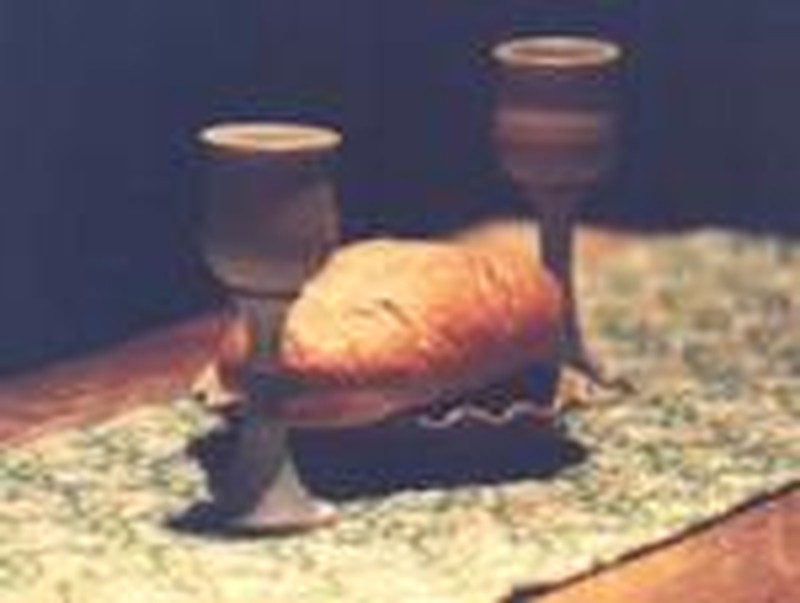Ministry Matters: The Divine Appointment
- John Beukema Contributing Writer
- Published Jan 29, 2004

It was Communion Sunday. The Table was draped with a spotless, white cloth, covering the stacks of trays. The pastor looked over the congregation with anger. "There is so much sin among you," he shouted. "None of you are worthy to participate in this observance!" Like a thunder clap he was gone, leaving a congregation shocked and confused. This pastor eventually left the ministry, but not before reducing the church to a small group. Needless to say, that was a memorable Communion.
But memorable and meaningful are not synonymous. One certainly does not guarantee the other. I must confess that I gave up trying to make Communion more meaningful long ago. Understood properly, it is in itself the most meaningful of acts that the church carries out.
Recently, a young couple told me what happened in their pew on Easter Sunday. As I introduced the Table, their grade school daughter began pleading with them to include her. The girl was ready with answers. "I know what the bread means," she whispered. The parents looked at each other. The elements were coming closer. The girl talked about sin and what Jesus did. Then seeing her parents hesitate she added, "Besides, I'm hungry." Mom and Dad said no, whereupon the girl threw a fit. This child is not alone in her lack of clarity regarding the meaning and significance of the Table. How many adults pay little attention to the magnitude and magnificence of this event?
Many of us in ministry wonder, ‘What can I do to heighten their awareness?’ As I gather my people around the Table, there are critical factors I try to keep in mind.
Get Out of the Way
I want to be certain my presence is not intruding upon the moment. I do my best to get out of the way, let my words be few, my movements necessary, and my instructions clear.
Some of the most memorable and meaningful remembrances of the Lord's death I have been a part of, were also the simplest. They involved no shining communion trays, no musical instruments, no well-trained servers and no uniform servings of bread and cup. Remembering the simplicity of what Jesus instituted guards my propensity to overproduce Communion. The power of the elements themselves is sufficient. I want the word and the Spirit to speak without my well-intentioned interference.
Even then there have been times when God's work on me individually has surfaced before all. Not long ago, we were singing "Lamb of God" during the distribution of the elements. I began to weep. As I served the Deacons, I began to sob uncontrollably. It took some time for me to regain my composure, and it certainly made some people around me uncomfortable. Yet, I was not ashamed. Although I want to stay out of the way, I also must be authentic. It was no fabrication or emotional ploy. It was personal confrontation with the meaning of Communion. Any attempt to manufacture meaning would be akin to holding up an applause sign.
Embrace the Tensions
Is there anything more paradoxical than this observance? We need to feel the shock and shame of the agonizing death of our Savior. We need to sense the horror and heartache of the bloody payment for sin. Yet there is also the unbounded joy of knowing God's love, the exhilaration of forgiveness and acceptance before God. It is Good Friday and Easter all at once. It should be at least difficult, if not impossible, to participate in Communion without experiencing both sides. Though I want my words to be few, it is my responsibility to explain the tensions.
Included in that is the need to both warn and welcome. It is only fair and fitting that we declare who is welcome at the Table. It is not my table, nor the church's, but it is the Table of the Lord. All who belong to him are received. At the same time, we must be serious about the warning not to take this lightly and to come with understanding or face the consequences.
Another tension is between individual and corporate. There must be a "me" focus, regarding personal sin and recognition of the elements. But the "we" focus must not be neglected. This Table is not about me, but about the Lord and my relation to Him. He has saved a people for Himself. Christians around the globe gather around the Table, and the one loaf testifies to our oneness in Christ.
Above all I want the tensions to remain, and do not attempt to alleviate or explain them away. Evangelicals tend to demystify everything. That is a mistake regarding Communion. In it's simplicity, there is still an inexplicable mystery. I agree with John Calvin. "If anybody should ask me how this communion takes place, I am ashamed to confess that that is a secret too lofty for either my mind to comprehend or my words to declare."
Creativity without Compromise
I come from a non-liturgical tradition, yet every Communion managed to be virtually identical anyway. Now as a pastor, I want to include some variations: liturgy spoken by the people; a phrase repeated by all as they take each element, e.g. "Your body bore the weight of my sin;" adequate time allowed for confession through silence, song, written prayers; alternating the way in which people receive the elements, e.g. being served, coming forward or tincture (dipping bread into the cup).
Occasionally someone has a suggestion about doing Communion differently. The one I listened to most carefully was from a former All-American football player who could snap me like a twig. Suggestions are welcome, but examined closely. There are theological reasons why we have one Table and not several, why we partake together rather than everyone for themselves, why we use bread and cup. The idea of using elements other than what Scripture mentions accomplishes little other than novelty. Substituting Cool-Aid and pizza trivializes the truth.
Years ago, a new attender refused to take Communion because of the type of bread we used. It pushed the Elders to do a study on the subject. We found that although no particular type of bread was required by Scripture, justification could be made for several preferences: common bread; leavened (representing Jew and Gentile in Christ among many other things); loaf (signifying the one sacrifice and the one body); baked (symbolizing God's judgment on sin); unbroken prior to distribution. We don't slavishly follow these conclusions, but it does provide parameters.
Creative changes can be helpful, but what makes Communion meaningful has far more to do with perception than packaging. I realize that some desire for modification is simply a reaction to ritual. But ritual is not a four-letter word. It does not eliminate being real. Ritual simply means an established or prescribed procedure. That describes Communion. The Table itself is formulaic. Paul said what was "handed to me, I delivered to you." (1 Cor.11:23) We have greater specifics about what was said by Jesus and by the early church regarding Communion, than about any other part of worship. In a search for meaning, we must be wary of jettisoning New Testament language, the order of the elements, their identity, or the closing proclamation.
Allow for Holy Moments
Recently, a young couple in our church was on the verge of divorce. He battled with alcohol, but that was just part of the problem. Through loving but firm confrontation, God brought them to repentance. A few days later, they came forward during Communion. There they confessed their failings and their desire to begin again. The divorce papers were torn up, and their commitment to one another was renewed. At the same time, they called for the support and prayers of the congregation. This was a blast of reality and honesty totally in keeping with Communion. The Table is about reconciliation with God and with one another. Giving opportunity for such holy moments is important but must be done appropriately and wisely. I will not allow individuals to use the Table as a personal confession booth. But there are significant events within the life of the congregation that are properly and most powerfully dealt with at Communion.
Communion should also an intimate experience. My wife and I had a night alone on an anniversary years ago. We spent the day seeing Niagara Falls, then we went to dinner in the Skylon Tower, a revolving restaurant overlooking the Falls. It was 9:30 PM, we were all dressed up and feeling very cosmopolitan. Our reservation put us at a table by the window. Just as we began to enjoy ourselves, a couple was seated right next to us. I mean the guy sitting beside me was closer than my wife. Our elbows were touching. In great contrast to us, the couple was wearing T-shirts and shorts. The fellow ordered a beer and began drinking it out of the bottle. Our air of intimacy evaporated. I was unable to say anything to Amy that this couple couldn't hear equally well. After fifteen minutes, we were still trying to make the best of it when they got up and left. I guess they felt as awkwardly as we did.
Intimacy has nothing to do with proximity. The apostle Paul calls the bread and cup a participation in the body and blood of Christ. But mere proximity to the Table and ingestion of elements secures nothing. Our presence and participation neither guarantees standing before God, nor fellowship with each other. So, in every way permissible, we must call ourselves and others to the bare reality of Communion.
This is a multi-sensory reminder that Christ's death is central to our faith. It is not a marker to be admired or a toy to tinker with, it is an event to be experienced. As you lead others into that experience, remember that memorable and meaningful are not synonymous, and get out of the way. Remember that there is mystery involved, so embrace the tensions inherent in the ritual of Communion. Remember that it’s about perception not packaging, so be creative without compromise.
And above all, remember that this is a divine appointment, so allow for holy moments. Just being present is not enough.
--John Beukema, senior pastor of Western Springs Baptist Church in Western Springs, IL since 1996, holds a Doctor of Ministry from Trinity International University. John has written numerous articles for Christian publications. His book, Stories from God's Heart, was published by Moody Press. John and his wife Amy have two daughters.




















